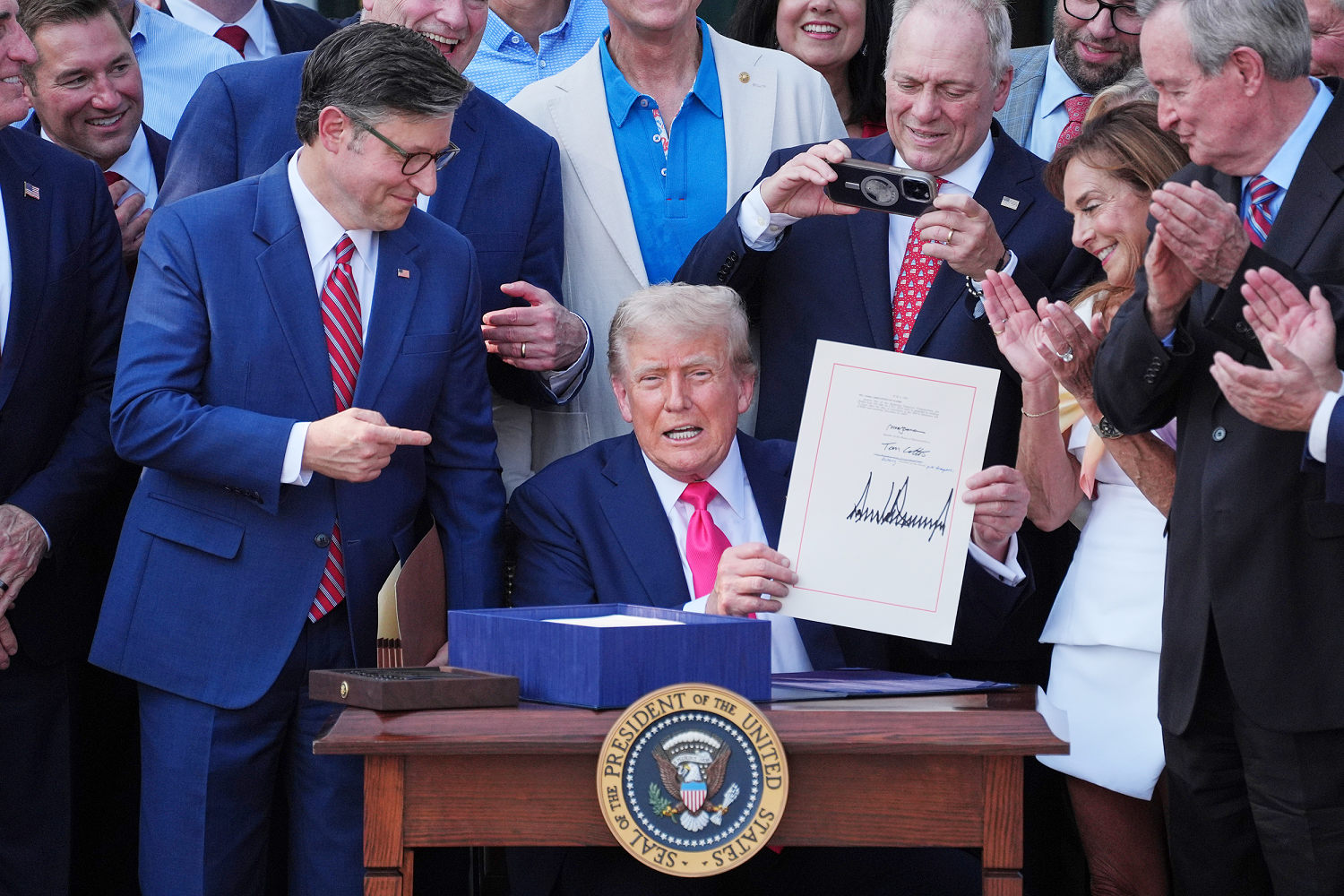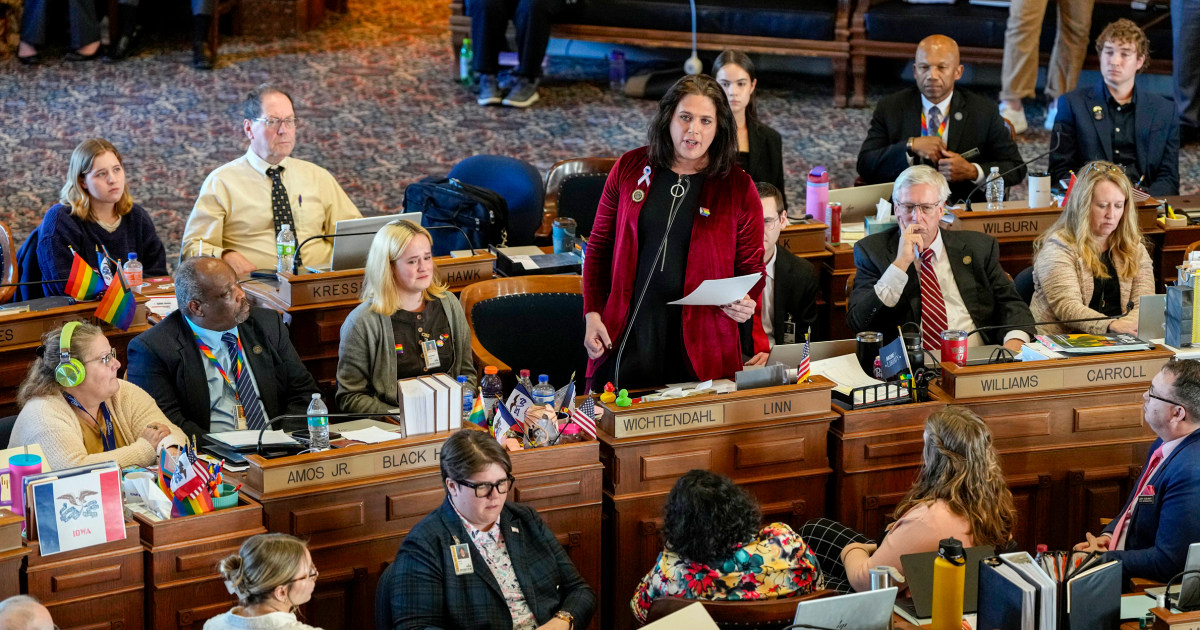
WASHINGTON — The war over President Donald Trump’s megabill is just beginning, with both parties saying it will define the midterm elections next year, when control of Congress is up for grabs.
Republicans start on the back foot, with recent surveys showing the bill is unpopular, even with pro-Trump cohorts. Still, GOP leaders say they have a plan to turn things around and make the legislation Trump signed into law last week part of an offensive push to protect their House and Senate majorities.
Meanwhile, Democrats are gearing up for a political onslaught aimed at unseating Republicans who voted for it. The House Democrats’ campaign arm has already launched a digital ad buy on Meta across 35 GOP-held competitive districts slamming lawmakers for voting to harm rural hospitals. Part of Democrats’ strategy is to highlight that many Republicans who threatened to vote down the bill because of steep Medicaid cuts ended up voting for it anyway.
“The so-called moderate House Republicans have shamelessly lied for months — hiding behind meaningless letters and performative tweets — claiming they’d protect Medicaid, food assistance and energy jobs,” said Justin Chermol, a spokesman for the Democratic Congressional Campaign Committee. “But their vote is the only thing that matters, and they’ll pay the price next year.”
Republicans say they have a strategy to avoid a repeat of the midterms in 2018, when Democrats attacked them for Trump’s original tax cuts, which they argued disproportionately benefited the wealthy, and for seeking to cut health care for the working class by unsuccessfully trying to repeal the Affordable Care Act. Democrats went on to take back the House majority.
This time around, Republicans say they will campaign on individual pieces of the bill that poll well and ignore the provisions that are less popular. GOP leaders and strategists are encouraging their candidates to lean into the “wins” of Trump’s agenda: tax cuts on overtime and tips, child care subsidies and work requirements for able-bodied adults.
“Last time, we ceded ground to Democrats,” a senior aide to Republican leadership told NBC News. “We won’t do that again.”
Republicans also argue that some working-class people will begin to feel savings from two particular provisions of the bill, tax cuts on tips and overtime pay, when they take effect next summer, just ahead of the midterm elections.
But most of the tax provisions are extensions of the current rates, meaning most voters will see little change in their tax bills — another challenge for Republicans in selling the bill.
Pressed about how candidates will defend cuts to Medicaid, a high-ranking GOP strategist who is close to Trump said they won’t focus on it, instead touting “the money in the pockets of working-class Americans and their increased safety” from other provisions in the bill.
Republicans see bill as the ‘defining issue of 2026’
Republican leaders are expected to hit the road, including in swing districts, in the coming months to sell the bill. In the meantime, they plan to flood local airwaves promoting the legislation, according to a senior GOP source familiar with the plans. And the National Republican Congressional Committee plans its own spate of attack ads accusing Democrats of supporting a tax hike for having voted against the bill, which extends tax cuts Trump enacted in 2017, the source added.
In a new memo obtained by NBC News, the NRCC encourages Republicans to accuse Democrats of voting to “block tax cuts” and “leave the border wide open,” referring to roughly $150 billion in the bill for immigration enforcement.
“House Republicans will be relentless in making this vote the defining issue of 2026, and we will use every tool to show voters that Republicans stood with them while House Democrats sold them out,” NRCC spokesman Mike Marinella said in a statement.
Meanwhile, the National Republican Senatorial Committee recently circulated internal polling instructing candidates to message aggressively on tax cuts. The only mention of Medicaid in the three-page document touts the popularity of work requirements and frames the nearly $1 trillion in cuts as “reforms” to keep benefits from undocumented immigrants.
The calculation among many Republicans in battleground states and districts who voted for the bill is that the Democratic warnings about massive cuts to Medicaid will fall flat with voters — not only because the cuts were tailored to target “waste, fraud and abuse,” but also because the changes aren’t set to kick in until after the 2026 midterms.
Still, it’s a risky gamble, and many vulnerable Republicans are privately bracing for potential political blowback in their districts. The bill is projected to lead to 11.8 million fewer people having insurance by 2034, according to the nonpartisan Congressional Budget Office.
Perhaps the biggest driving force behind their “yes” votes was not wanting to defy Trump. He had threatened to back primary challengers to two Republicans, Rep. Thomas Massie of Kentucky and Sen. Thom Tillis of North Carolina, who opposed the bill. (Tillis ended up deciding not to seek re-election.)
“Seventy-seven million Americans voted to give Donald Trump a platform to make positive changes for the United States; 1.7 million Wisconsinites voted for Donald Trump,” said Rep. Derrick Van Orden, R-Wis., who is expected to face a competitive re-election race next year. “This is a mandate by the American people, and we’re fulfilling this mandate.”
When he was pressed about whether Republicans are just falling in line because of Trump, Van Orden pushed back: “The president of the United States didn’t give us an assignment. We’re not a bunch of little b—— around here, OK? I’m a member of Congress that represents almost 800,000 Wisconsinites.”
The Democratic group House Majority Forward is working on ads to attack vulnerable Republicans for the vote — including Van Orden, Scott Perry of Pennsylvania and Tom Barrett of Michigan, who all narrowly won their 2024 races.
Democrats plan to target wobbly Republicans
In the run-up to the vote, politically vulnerable Reps. David Valadao, R-Calif., and Rep. Jen Kiggans, R-Va., led sternly worded letters signed by more than a dozen of their colleagues slamming steep cuts to Medicaid and clean energy tax credits.
But when it came time to vote, nearly all of them folded under pressure from Trump and ended up supporting provisions that they loudly criticized — and that could have major impacts on their constituents. Most of those lawmakers are targets of the DCCC’s new ad campaign.
Two weeks ago, Valadao led a group of 16 Republicans in writing a letter vowing to oppose the Senate bill’s aggressive Medicaid cuts.
“Protecting Medicaid is essential for the vulnerable constituents we were elected to represent,” they wrote. “Therefore, we cannot support a final bill that threatens access to coverage or jeopardizes the stability of our hospitals and providers.”
All 16 of them voted for the bill Thursday.
Valadao, who represents a swing district with a large share of Medicaid recipients, warned five days before the final vote that Republicans must undo the Medicaid changes in the Senate bill — “otherwise, I will vote no.”
His office didn’t respond to messages seeking comment on his vote.
In a statement, Kiggans said that “no legislation of this size is perfect—but there’s no question that this bill includes major priorities I’ve been fighting for on behalf of Coastal Virginia.”
Valadao was among the group of lawmakers who visited the White House before the vote last week. During the meeting, Trump and Dr. Mehmet Oz, the administrator of the Centers for Medicare and Medicaid Services, walked them through how the bill’s changes to Medicaid will be implemented.
Rep. Jeff Van Drew of New Jersey, who had been one of the loudest Republicans calling to protect Medicaid, walked away from the meeting arguing they have time to change the law back if they later determine it will be too harmful, since the biggest changes don’t take effect for several years.
Asked by NBC News whether it was risky to bank on the prospect of Congress’ reversing key components of the bill, Van Drew said: “No, I think that it’s possible. The point being that it is being done slowly.”
Another moderate GOP lawmaker who had been on the fence, granted anonymity to discuss internal party deliberations, said what ultimately made them feel comfortable voting for it is that many of the Medicaid changes, like the provider tax, won’t take effect until after the midterm elections.
Under the bill, the new work requirements for Medicaid and the Supplemental Nutrition Assistance Program will kick in latest by the start of 2027, while new restrictions on state provider taxes — which trigger federal payments that are a major source of revenue for rural hospitals — will start in 2028.
Last month, an overlapping group of 13 House Republicans, led by Kiggans, wrote a letter calling for saving clean energy funding and tax credits, saying they were “deeply concerned by several provisions” in the emerging package. They warned that “project cancellations will continue to snowball” without protecting the incentives that caused the investments.
Twelve of the 13 Republicans voted for the bill — every signer except Brian Fitzpatrick of Pennsylvania.
Along with Valadao and Kiggans, Republicans who signed both letters include Juan Ciscomani of Arizona, Rob Bresnahan of Pennsylvania, Mike Lawler and Andrew Garbarino of New York, Mariannette Miller-Meeks of Iowa, Young Kim of California and Don Bacon of Nebraska. (Bacon announced last week that he will retire.)
Meanwhile, some Republicans have already started to lean into parts of the bill.
Sen. Josh Hawley of Missouri, who openly acknowledged the bill’s Medicaid changes will “take away health care from working people,” is holding an event Tuesday morning to celebrate the inclusion of his bipartisan effort to expand federal compensation for nuclear waste victims.








